Today Current Affairs: 22nd October 2022 for UPSC IAS exams, State PSC exams, SSC CGL, State SSC, RRB, Railways, Banking Exam & IBPS, etc
Table of Contents
Ek Bharat Shreshta Bharat:

Government of India has announced a month-long programme named the ‘Kashi-Tamil Sangamam’ “to strengthen” and “rekindle” the cultural and civilisational bond between Tamil Nadu and Varanasi.
- This programme would be a part of the Ek Bharat Sreshtha Bharat initiative.
Ek Bharat Shreshtha Bharat:
- It was launched in 2015 to promote engagement amongst the people of different States/UTs so as to enhance mutual understanding and bonding between people of diverse cultures, thereby securing stronger unity and integrity of India.
- It is an initiative of the Ministry of Education.
- Every State and UT in the country would be paired with another State/UT for a time period, during which they would carry out a structured engagement with one another in the spheres of language, literature, cuisine, festivals, cultural events, tourism etc.
Forest Conservation Rules, 2022:

NCST had recommended to the Union Environment and Forest Ministry to put the new Forest Conservation Rules, 2022, on hold.
Forest conservation rules,2022 :
- The rules were issued by the Environment Ministry in June this year under the Forest Conservation Act.
- The Forest Conservation Rules deal with the implementation of the Forest Conservation Act (FCA), 1980.
- They prescribe the procedure to be followed for forest land to be diverted for non-forestry uses such as road construction, highway development, railway lines, and mining.
Changes made in the forest rules:
- Rules make a provision for private parties to cultivate plantations and sell them as land to companies who need to meet compensatory forestation targets.
- No mention of tribals and forest-dwelling communities whose land would be hived off for developmental work.
- No consent of Gram Sabha is needed: the projects once approved by the FACwill then be passed on to the State authorities who will collect the compensatory fund and land, and process it for final approval.
- Previously consent of gram sabha, or the governing body in villages in the area, was required to give written consent to the diversion of the forest.
- It has defined forest land.
- No approval is needed for Strategic Projects: e.g. strategic and security projects of national importance
- Allows building in Forests.
What Is The UNSC 1267 Committee?
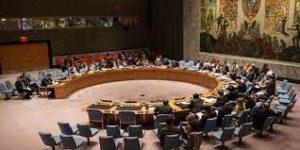
China placed a “hold” on two joint India-US proposals, to designate Lashkar-e-Taiba (LeT) top leaders at the United Nations Security Council’s (UNSC) 1267 list of terrorists affiliated to Al Qaeda and ISIS.
UNSC 1267 Committee:
- It was first set up in 1999 (updated in 2011 and 2015), and strengthened after the September, 2001 attacks.
- It is now known as the Da’esh and Al Qaeda Sanctions Committee.
- It comprises all permanent and non-permanent members of the United Nations Security Council (UNSC).
- The 1267 list of terrorists is a global list, with a UNSC stamp. It is full of Pakistani nationals and residents.
- It is one of the most important and active UN subsidiary bodies working on efforts to combat terrorism, particularly in relation to Al Qaeda and the Islamic State group.
- It discusses UN efforts to limit the movement of terrorists, especially those related to travel bans, the freezing of assets and arms embargoes for terrorism.
- Any member state can submit a proposal for listing an individual, group, or entity.
- The proposal must include acts or activities indicating the proposed individual/group/entity had participated “in the financing, planning, facilitating, preparing, or perpetrating of acts or activities” linked to “ISIL (Da’esh), Al-Qaida or any cell, affiliate, splinter group or derivative thereof”.
- Decisions on listing and de-listing are adopted by consensus.
- The proposal is sent to all the members, and if no member objects within five working days, the proposal is adopted.
- An “objection” means curtains for the proposal.
- Any member of the Committee may also put a “technical hold” on the proposal and ask for more information from the proposing member state. During this time, other members may also place their own holds.
- The matter remains on the “pending” list of the Committee until such time as the member state that has placed the hold decides to turn its decision into an “objection”, or until all those who have placed holds remove them within a timeframe laid down by the Committee.
- Pending issues must be resolved in six months, but the member state that has placed the hold may ask for an additional three months.
Pradhan Mantri Awas Yojana – Urban (PMAY-U) Awards 2021:
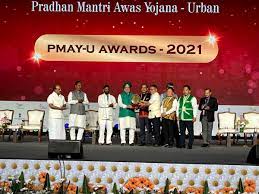
In the Pradhan Mantri Awas Yojana – Urban (PMAY-U) awards 2021, Uttar Pradesh bagged the first position followed by Madhya Pradesh and Tamil Nadu at second and third place, respectively. Gujarat won five special category awards.
- The Mission will be implemented during 2015-2022.
- It is implemented by the Union Ministry of Housing and Urban Affairs (MoHUA).
- Mission:To achieve the goal of Housing for All in Urban areas by 2022, when the Nation completes 75 years of its Independence.
- Under it, central assistance will be provided to Urban Local Bodies (ULBs) and other implementing agencies through States/UTs for:
- In-situ Rehabilitation of existing slum dwellers using land as a resource through private participation
- Credit Linked Subsidy
- Affordable Housing in Partnership
- Subsidy for Beneficiary-led individual house construction/enhancement.
- Funding:Credit linked subsidy component will be implemented as a Central Sector Scheme while other three components will be implemented as Centrally Sponsored Scheme (CSS).
- Eligibility:All statutory towns as per Census 2011 and towns notified subsequently would be eligible for coverage under the Mission.
2nd India-Africa Defence Dialogue (IADD):
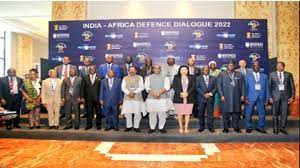
The 2nd India-Africa Defence Dialogue (IADD) was held on the sidelines of DefExpo 2022 in Gandhinagar, Gujarat.
India-Africa Defence Dialogue:
- Theme: Adopting Strategy for Synergizing and Strengthening Defence and Security Cooperation.
- The Gandhinagar Declaration was adopted as an outcome document of IADD 2022.
- It proposes to enhance cooperation in the field of training in all areas of mutual interest by:
- increasing training slots and deputation of training teams,
- empowerment and capability building of the defence forces of Africa,
- participation in exercises, and
- providing humanitarian assistance during natural disasters.
- A volume on India–Africa Defence cooperation was also released.
India–Africa Security Fellowship Programme:
- IADD also encouraged further research of security issues through offer of fellowships to experts from African countries.
- This will be done under the India–Africa Security Fellowship Programme.
Kashi-Tamil Sangamam:
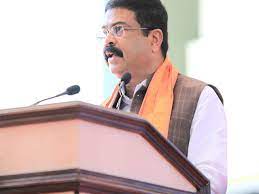
The Union Government recently announced a month-long programme to “strengthen” and “rekindle” the cultural and civilisational bond between Tamil Nadu and Varanasi.
- ‘Kashi-Tamil Sangamam’ programme would be held from November 16 to December 16.
- This programme, which would be a part of the ‘Ek Bharat Shreshtha Bharat’ initiative which is aimed at rekindling the civilisational link between the new Kashi and Tamil Nadu both deep centres of knowledge.
- Building a heritage bridge for the new generation was a key feature of the National Education Policy.
- As part of the programme, 2,500 people divided into 12 groups would be travelling to Varanasi by train during the period.
- The journey points in Tamil Nadu would be Chennai, Rameswaram and Coimbatore.
- The groups would include students, teachers, artisans and people from various walks of life.
- The tours would include seminars, lectures, group meetings and visits to the Kashi Vishwanath temple and centres of important Tamil cultural heritage in Varanasi.
- The knowledge partners for the programme would be IIT-Madras and the Banaras Hindu University, while the Uttar Pradesh government would be the host State.
Indian Army Emergency Procurements (EP):
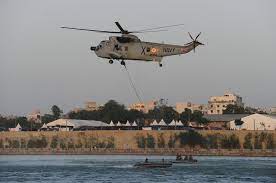
Indian Army’s 4th round of emergency procurement is to be from India
- The Indian Army, which has made three tranches of Emergency Procurements (EP) in the last few years, is preparing for a fourth round of EP which will be entirely from the domestic industry.
- Three tranches of EPs were executed under which 68 contracts worth ₹6,000 crore were placed.
- Emergency financial powers were granted to the armed forces by the Defence Ministry in the past under which they could procure weapons systems up to ₹300 crores on an “urgent basis without any further clearances to cut short the procurement cycle.
- It also gives them an opportunity to test various systems in the field before going in for larger acquisition through the capital budget route.
Scorched-Earth Tactics : Russia – Ukraine War
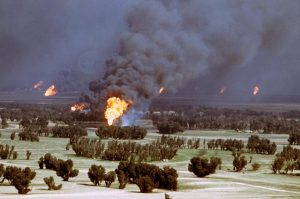
German Chancellor recently said that Russia is using ‘scorched-earth tactics’ in Ukraine.
- Scorched earth tactics form part of a military strategy which seeks to destroy anything that could be of use to the enemy, including energy supplies, bridges, provision stores, agricultural fields, road and railway links, etc.
- The destruction could be carried out by the enemy, or by the retreating army of a country which does not want invaders to use its resources.
- Harming civilians as part of this strategy has been banned under the 1977 Geneva Convention.
- The strategy seeks to deplete the enemy’s resources to sustain warfare, and also break their morale by inflicting heavy hardships on combatants and non-combatants alike.
- According to the Oxford Reference, the “term was first used in English in 1937 in a report of the Sino-Japanese conflict, and is apparently a translation of Chinese jiāotŭ”.
- Scorched earth policy has been part of warfare since ancient times, with the nomad Scythians using the tactics in their war against the Persian Achaemenid Empire led by King Darius the Great (who ruled 522 BCE to 486 BCE).
- In India, the armies of Maratha leader Chhatrapati Shivaji were known for their scorched earth tactics.




